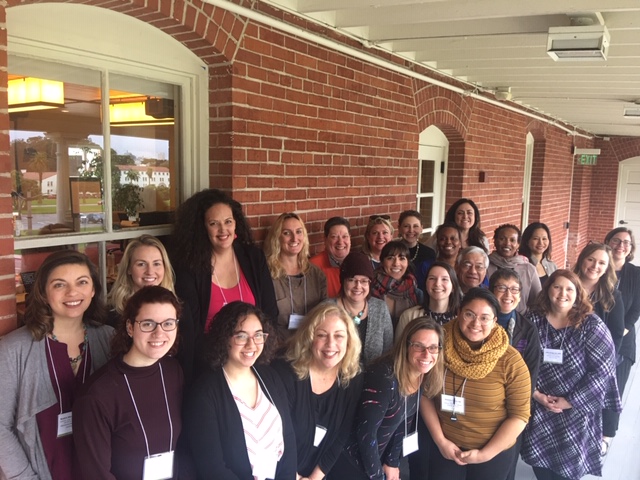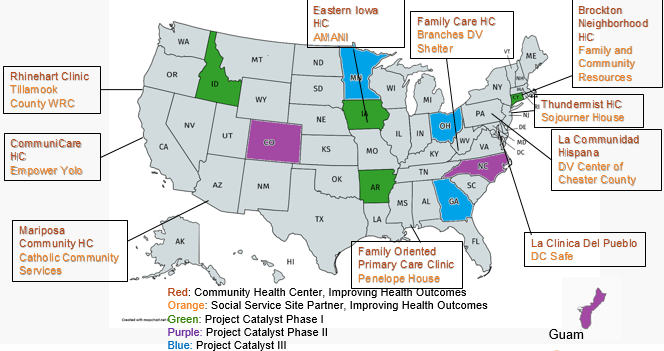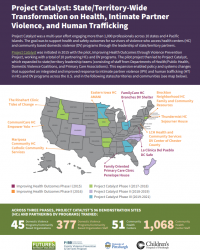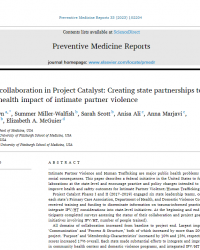State-wide Work for Building Health Center and DV Program Partnerships
Project Catalyst: State-Wide Transformation on Health, IPV, and Human Trafficking was a four year initiative funded through a collaboration of U.S. Department of Health and Human Services (DHHS) partners, including the Administration for Children and Families’ (ACF) Family and Youth Services Bureau, the HRSA Bureau of Primary Health Care, and the HRSA Office of Women’s Health. Technical assistance and training was provided by Futures Without Violence (FUTURES), along with an evaluation conducted by the University of Pittsburgh. Project Catalyst engaged more than 1,000 professionals across 10 states and 4 Pacific Islands. The goal was to support health and safety outcomes for survivors of violence who access health centers (HC) and community based domestic violence (DV) programs through the leadership of state/territory partners.
Project Catalyst was initiated in 2015 with the pilot, Improving Health Outcomes through Violence Prevention Project, working with a total of 10 partnering HCs and DV programs. The pilot project then led to Project Catalyst, which expanded to state/territory leadership teams (consisting of staff from Departments of Health/Public Health, Domestic Violence Coalitions, and Primary Care Associations). This expansion enabled policy and systems changes that supported an integrated and improved response to intimate partner violence (IPV) and human trafficking (HT) in HCs and DV programs across the U.S. and in the following states/territories and communities: Arkansas, Colorado, Connecticut, Georgia, Guam, Idaho, Iowa, Minnesota, North Carolina, and Ohio. For more information about Project Catalyst, download this 3 pager and watch the recorded webinar “Lessons Learned from Project Catalyst: State/Territory-Wide Transformation on Health, Intimate Partner Violence, and Human Trafficking.”
Each state/territory leadership team worked closely with at least five health center and DV program partnerships in their state/territory, providing training and technical assistance to support a coordinated response to IPV and human trafficking, bolster prevention efforts, and support survivor health in community health centers and DV program partnerships.
Across three phases, Project Catalyst’s 96 demonstration sites (HCs and partnering DV programs) trained:
45 Domestic Violence Programs/Community Based Organizations
377 Domestic Violence Programs/Community Based Organization Staff
51 Community Health Centers
1,068 Community Health Center Staff
Project Catalyst had tremendous impacts and can be replicated and implemented in any state/territory or local community. See these key resources and tools to adapt the Catalyst model in new states and territories:
- 3.5 hour Training Curricula for health centers; and another for DV programs
- Interactive exercises for virtual, or in-person trainings
- Adaptable agendas and flyers
- Handouts on safe harbor laws, reflective practice + training video vignettes
- A health intake form for DV programs to assess health needs and connect clients to health centers
- Tools to build partnerships, like a sample MOU
- Evaluation tools and multi-lingual patient and population-specific safety card tools
- Full suite of Project Catalyst tools:
- 3.5 hour Training Curricula for health centers; and another for DV programs
www.ipvhealthpartners.org, a toolkit developed by and for community health centers and domestic violence programs looking to forge or expand partnerships
- Watch the recorded webinar “Lessons Learned from Project Catalyst: State/Territory-Wide Transformation on Health, Intimate Partner Violence, and Human Trafficking.”
What is Project Catalyst’s impact so far?
All health centers that completed follow up assessments reported having a policy in place to see patients alone. This is a key practice to provide privacy and confidentiality for survivors.
95% of trained providers reported an increased understanding about the impact of IPV and human trafficking on health.
Three months after training, providers reported they were almost three times more likely to refer patients to their domestic violence agency partners.
Recent Published Articles:
- Cross-sector collaboration in Project Catalyst: Creating state partnerships to address the health impact of intimate partner violence.
- Policy and Systems Change in Intimate Partner Violence and Human Trafficking: Evaluation of a Federal Cross-Sector Initiative
- Project Catalyst: Evidence-Based IPV and Trafficking Engagement
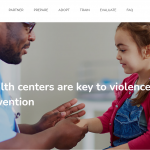
IPVHealthPartners Online Toolkit
Online toolkit for building health center and domestic violence program partnerships…
More Info >
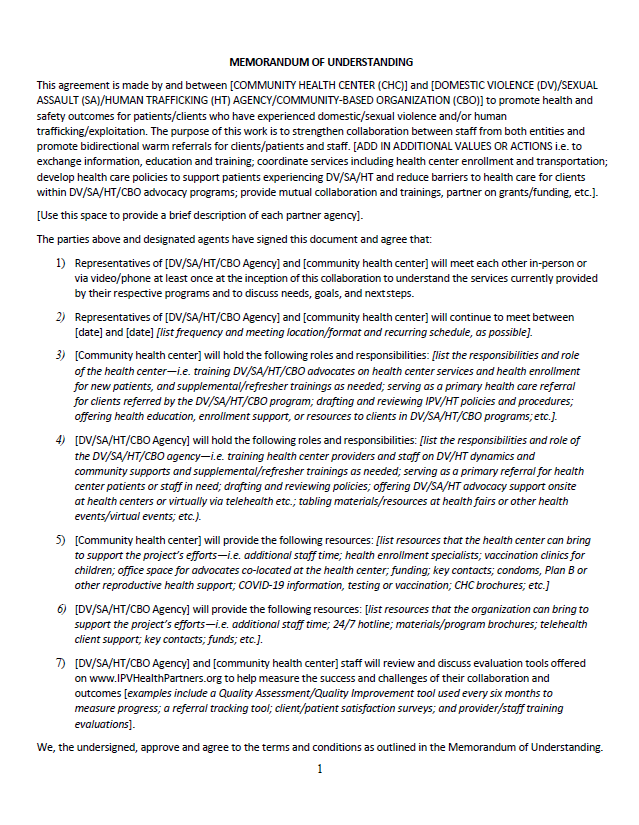
Sample Memorandum of Understanding
Sample MOU for health center and domestic violence program partnerships… More Info >
